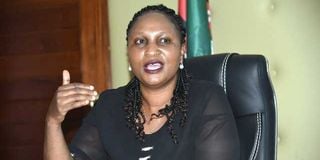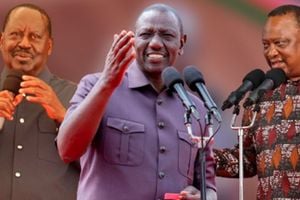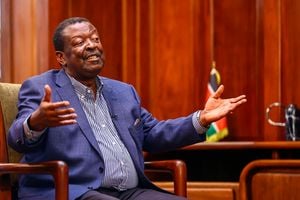
Registrar of Political Parties Ann Nderitu.
Exchequer billions of shillings for political parties and the desire to enter a coalition as a principal is at the heart of the latest race to register new political outfits.
Nation has established that the Office of the Registrar of Political Parties (ORPP) is currently processing close to 30 proposed new parties as politicians begin to acquire new vehicles for purposes of the 2027 General Election.
Some individuals, who may not be interested in running for political offices, are also in the latest craze to enlist new outfits with plans of selling them in the run-up to the election.
Selling and buying of political parties have since become a booming business, mostly because of fears by politicians of being rigged out in party primaries.
Some top political leaders have also in the past ended up partyless after rival factions took off with the party certificate.
Some of these incidents have forced ambitious politicians to have their political party secure their election tickets to negotiate for a coalition.
The billions of shillings for political parties have also made running a political party a lucrative business.
At least 48 political parties that participated in the 2022 elections are benefiting from the millions of taxpayers’ money to run the affairs of their parties.
The Registrar of Parties has since issued provisional registration to at least six new outfits.
The office has further issued notice for provisional registration for an additional three parties.
Registrar of Parties Anne Nderitu told Nation that her office was processing close to 30 proposed new political parties.
She said the registration for the new parties was at different stages.
The disclosure by the ORPP comes days after former Deputy President Rigathi Gachagua indicated his plan to name his new party in two weeks.
Mr Gachagua has in the past regretted why he did not form a political party before joining hands with President William Ruto.
ORPP issued a notice for provisional registration for the Forum for Economic Development Agenda (FEDA), Kenya United Generation Party (KUG), and The Future Party (TFP).
FEDA has Yale blue, gold, and red as its party colours and a gate as its symbol. It has listed Stephen Tinga, Lucy Wambui, William Keloi, Christine Ndegwa, Benard Koskei, and Risper Awuor as its founder members.
KUG – which has green, brown, and blue as its colours and an infinity circle as its symbol – has listed Jared Nyabuto, Sammy Mwanyaa, Sharon Jepkorir, Fredrick Wafula, Purity Mumbe, Vicky Chebet, Hezbon Oluoch, Cynthia Wangui, Joshua Mwonga, and Frejustus Kiima as its founder members.
TFP has luminous green, white, and navy blue as its colours and the lotus flower has its symbol. It has listed Mercy Chiluyi, Benerd Mutie, Jesse Thuo, Deolata Ngatho, Diana Kemunto, Ibrahim Moses, Daniel Mwangi, Eunice Barasa, Imelda Nyongesa, Robinson Makokha, Annastacia Jelimo, Francis Maina and Eric Wanyama as its founder members.
The six outfits that have obtained provisional certificates include The We Alliance Party (TWAP), whose symbol is a plate and a spoon, with blue and yellow as its colours. It has since applied for full registration, according to ORPP.
Others are the People’s Forum for Rebuilding Democracy (PFRD), Imarisha Uchumi Party (IUP), African Development Congress (ADC), Kenya Ahadi Party (KAP), and Democracy for Citizens Party (DCP).
Mr Gachagua while speaking at Matanya PCEA Church in Laikipia County on Sunday promised to announce the political party he intends to use to mobilise leaders as they plan to exit the ruling United Democratic Alliance (UDA).
Following his impeachment as the Deputy President, Mr Gachagua was officially kicked out as the UDA deputy party leader, and subsequently replaced with successor Kithure Kindiki.
“In two weeks, I will give you direction and I will do it in a live television interview. Currently, I am still consulting but early next month I will make a pronouncement,” Mr Gachagua said.
“Raila Odinga (former Prime Minister) is never elected to Parliament but he has loyal leaders right from the grassroots. The mountain region will never repeat the mistakes of 2022 when we rode on someone’s bus. After making him president, William Ruto started betraying us immediately,” said Mr Gachagua.
The country currently has a total of 90 fully registered parties. Out of these, only 48 parties actively participated in the 2022 General Election, according to the ORPP gazette notice on allocation of the Political Parties Fund.
United Democratic Alliance (UDA) of President William Ruto, Orange Democratic Movement (ODM) of Raila Odinga, Wiper Democratic Movement of Kalonzo Musyoka, Jubilee Party of former President Uhuru Kenya, and Democratic Action Party of Kenya (DAP-K) of Eugene Wamalwa are some of the major political parties by number of elected leaders.
Amani National Congress (ANC) of Musalia Mudavadi, which is also a major party, has since dissolved to merge with UDA.
Mr Gachagua has since indicated his plans to negotiate with other like-minded politicians in forming a political juggernaut for the 2027 elections.
Some of the leaders Mr Gachagua is courting are Wiper leader Kalonzo Musyoka, Eugine Wamalwa, and Trans Nzoia Governor George Natembeya.
Machakos Deputy Governor Francis Mwangangi and Kitui Senator Enoch Wambua, allies of Mr Musyoka, confirmed talks between the two top leaders. They, however, indicated that there was an agreement for individual parties to strengthen themselves before they could engage in coalition talks.
“There are so many leaders who are currently busy revamping their parties. The agreement is that we each strengthen our parties before we can begin the talks of forming a coalition,” said Mr Mwangangi.
“It is too early to start talking about coalitions, but individual parties have to put their houses in order by strengthening their structures and presence,” he said.
Mr Wambua said Mr Musyoka was engaging like-minded leaders from across the country to form a coalition when the time comes.
“My party leader is talking to leaders from all over the country. The talks with different leaders are at different stages but very soon the country will see a galaxy of trusted leaders who will drive this country on the right path,” said Senator Wambua.
Former Kiambu Governor Ferdinand Waititu in a recent interview confirmed that he was in the process of acquiring a new political outfit. The former governor who was removed from office by way of impeachment – which blocks him from running for office in the next election, disclosed that he will soon launch the outfit after ‘tying loose ends” in the acquisition.
“It is an already registered political party. It is in existence but not active. Allow us to tie loose ends before we can make it public,” he said. He also confirmed talks for a coalition between Mr Gachagua and Mr Musyoka.
It is not clear if Mr Gachagua is eyeing a newly registered outfit or if he plans to acquire one of the many existing political parties.
Dozens of parties that have never benefited from millions of shillings disbursed by the exchequer have for the first time after the 2022 elections received the monies, making the running of political parties a lucrative business. This was after the changes to the Political Parties Act.
The Act provides that 70 per cent of the money be distributed proportionately, based on the total number of votes secured by a political party in the preceding election.
Another 15 per cent is to be distributed proportionately to parties based on the number of candidates from special interest groups elected in the preceding General Election.
Ten per cent shall be shared out proportionately to parties, based on the number of representatives from the party elected in the preceding General Election while the remaining five per cent is for administration expenses by the ORPP.
The provision implies that any political party that participates in a General Election stands to benefit from the funds, based on the number of votes attributed to its candidates, even if a majority of them lose at the ballot.





